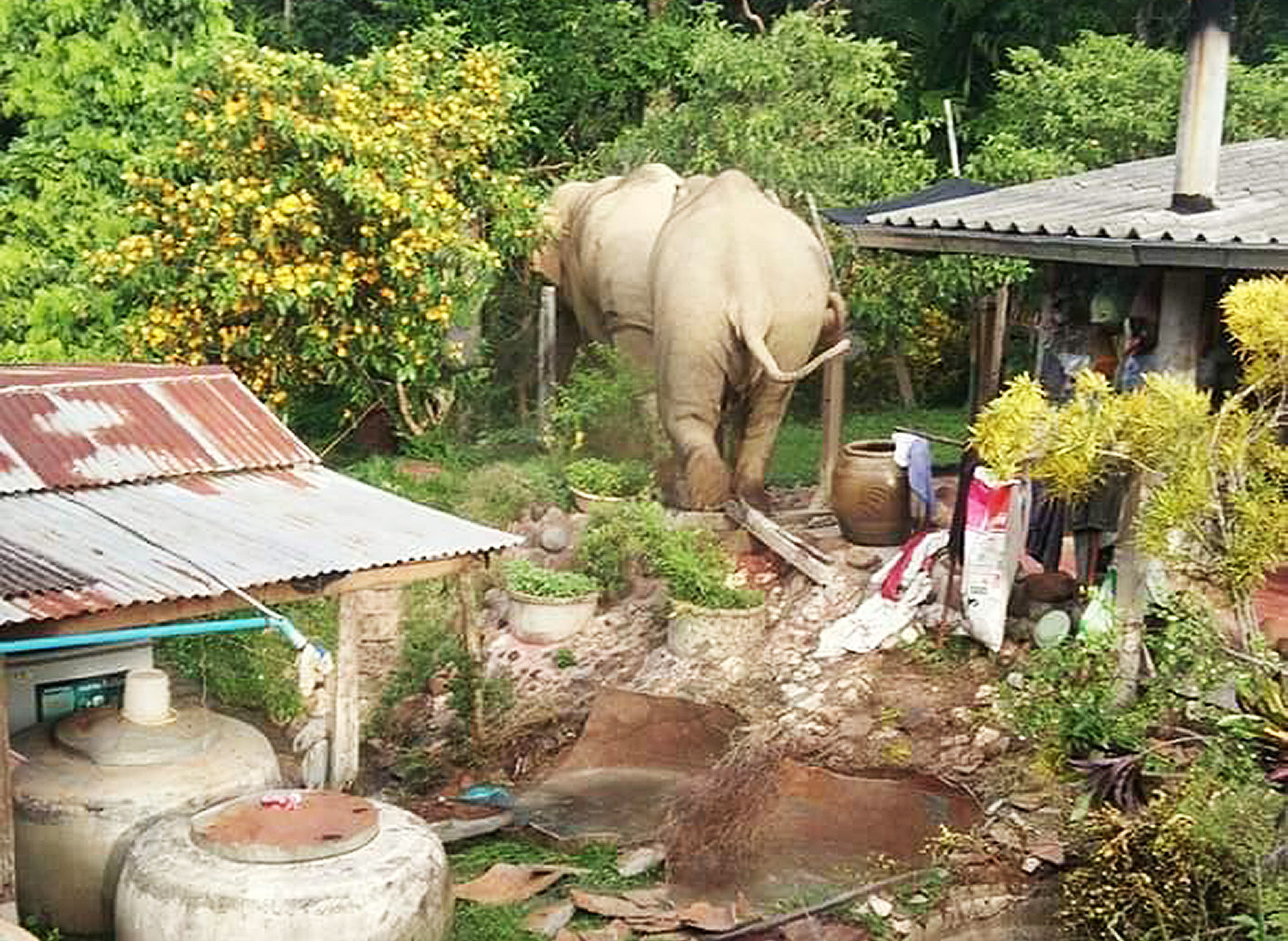News
Hungry Wild Elephants Raid Villagers Homes in Search of Food

Villagers in a community east of Bangkok awoke early Saturday to the sounds of wild elephants knocking on their doors and rooting in their gardens, most likely due to hunger.
Residents in a Prachin Buri community reported that three wild elephants from the Khao Ang Rue Nai Wildlife Sanctuary in the neighboring province of Chachoengsao had “knocked” on the doors of three homes.
They believe the elephants were looking for food because there have been reports of them crossing into Prachin Buri forests in search of food after their sanctuary was hit by drought.
According to residents who said they were too scared to leave their homes, the large mammals remained in the village for several hours.
Chamras Sroichampa, 58, said his barking dog alerted him to the elephants around 1 a.m. Looking out his window, he noticed a large creature feeding on his banana trees in the darkness.
When he went to inspect his garden after the pachyderms had left, he discovered that they had eaten a large number of bananas and potatoes.
Two other residents reported similar encounters with elephants searching for food in their gardens.
As trackers have been dispatched to locate the elephants, village elders have warned residents not to venture too far from their homes.
Tassanai Suthapoj, the permanent secretary for Prachin Buri, has been tasked with chairing a committee to consider declaring an emergency assistance zone in accordance with Ministry of Finance regulations in order to direct compensation to affected villagers.
Elephants feast on farmers crops
More than 40 elephants were spotted roaming in a forest just four kilometers from a farming community in Nakhon Ratchasima province, northeast Thailand, in September. Farmers reported that the hungry herd ate 60 Rai of crops in one week, feasting on rice, sugarcane, and corn.
The elephants emerged from Thap Lan National Park, a UNESCO World Heritage Site, in search of food in the Khao Pradu community, Jorokay Hin subdistrict, Khon Buri district.
After a week of devastation, Khon Buri Deputy District Chief Sitthikorn Hankharna, national park officials, community leaders, Buddhist monks, and disaster relief organizations have banded together to figure out how to drive the herd away from farmland.
The thermal imaging drone captured approximately 40 elephants, but officials believe the herd may contain up to 100 elephants in total.
Locals rely on farming for a living, but over the last week, everything within a 60-rai radius has been trampled or eaten, causing economic ruin for the community. Oraya Luengkatrok, the leader of Jorokay Hin subdistrict, expressed concern about the serious damage caused by wild elephants from the national park.
Thailand’s elephants appear to be in greater need of food, with reports of elephants wreaking havoc in communities emerging almost daily in the kingdom.
A week earlier, an elephant smashed its way into a woman’s kitchen through a concrete wall in Prachin Buri province. The elephant pierced the wall and stole fermented fish and other goodies from her kitchen.
A few weeks ago, a man in Hua Hin was trampled to death in his neighborhood by elephants that had escaped from Kaeng Krachan National Park, presumably in search of food.

Asian Elephants in Thailand
Asian Elephants are Asia’s largest land mammals, according to WCS Thailand. An adult Asian elephant stands about 2.5 meters tall and weighs 3 to 4 tons.
Asian elephants are herd animals that live in groups. A new generation male will leave his herd at the age of 6 – 7 years and will be ready to mate at the age of 10 – 15 years.
The young male elephant will be in rut during this time. The female will be ready for reproduction at the age of 15 – 16 years old, with the longest gestation period of any land animal at 22 months, and will give birth to a single cub.
Each litter is separated by four years. Elephant cub mortality can be attributed to natural predator hunting and infanticide (killed by males from other herds). Adult elephants, on the other hand, have a very low mortality rate.
They have a life expectancy of 60 to 70 years.































